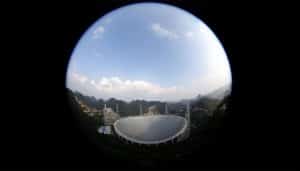There’s an ever-growing chance of an actual alien invasion taking place in the near future, that’s why scientists are now working on a defense mechanism based on lasers that would cloak our planet’s activity from any unwanted visitors.
A considerable portion of energy emanating from the human race is directed towards the discovery of alien life. Past the enthusiasm of such an accomplishment, there is always the possibility of these intelligent aliens not being so peaceful. Even more, in the case of an alien contact, they could see planet Earth as an extremely valuable place from where to harness resources. After all, we humans are exploiting it, so why shouldn’t they want to do the same?
Fortunately for us, a destructive alien scenario has been pictured by astronomers who also found a solution – cloaking our planet using lasers in case things go the other way around. So how will they do that you might ask? While on the lookout for planets outside of our solar system, astronomers are mainly tracking stars which dim periodically. That perturbation in light indicates that a celestial body is passing in front of it, thus revealing relevant traits about it such as the orbiting time, size, and even how close the planet is to the star.
Although this survey allows only for a few planets to be studied at a given time, it’s an effective way to determine where else could life reside in the universe. Now, if intelligent aliens would use a similar technique when scouting for hospitable planets, they’ll be in for a treat since humans have already developed a way to block all signals.
A project initiated by a team from Columbia University aims at blasting a laser whenever the Earth passes in front of the Sun, thus covering the dip in brightness receive by the Sun and ultimately cloaking us from a hostile alien species. At first, astronomers believed that altering the signal broadcasted by our planet would solve the issue, but they’ve soon reconsidered and found this cloaking scenario more viable. After all, it would only take a 30 megawatts laser blasting into space for 10 hours each year to completely block our planet’s signal whenever it passes in front of the sun. That’s almost the same energy amount collected by the International Space Station’s solar panels in a year, and it is well worth it considering that it could prevent Earth’s total annihilation.
Another possibility would be to use a system of turning lasers that would make us “invisible” on all wavelengths, but that would require approximately 250 megawatts of power. This system may seem like the best choice, but according to scientists, it could also make us more vulnerable to ETs scouting for signs of life because a total cloaking device would only offer limited protection, meaning that indirect signs of our planet can still be intercepted. In theory, this would rise suspicions since our planet will be perceived as a space anomaly.
Another safer way proposed by researchers is the cloaking of atmospheric signals associated with biological activity, such as oxygen and water vapors. This process would only take up to 160 kilowatts of energy and would make Earth look like a dead rock in space, a thing seemingly unwanted by the alien scouts.
“The atmospheric cloaking produces totally self-consistent observations,” said co-author of the study Alex Teachey. “They see a planet, but they think it’s just another dead world floating out in space.”
Whichever system they’ll choose to put in place, it won’t change the fact that ETs may be using technology that exceeds our imagination, thus penetrating through any defense system we build. However, aliens aren’t necessarily bad, and they are not necessarily looking for us, but why not give it a try and cloak the planet since we already have all the necessary means.
“We could build this next week if we really wanted to. It’s totally feasible with current technology,” added Alex Teachey.
There’s another thing though; if we’re trying to hide our planet from hostile alien species, why not assume they’re doing the same? If so, it’s likely they already have a system in place, unlike us who only aspire at one. (source)









